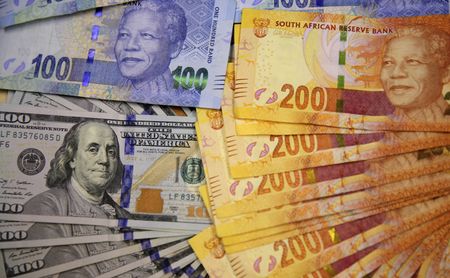JOHANNESBURG (Reuters) -The South African rand and stocks fell sharply on Thursday, as investors dumped riskier assets after Russian forces attacked Ukraine.
Sentiment was also dampened by Fitch Ratings pointing to difficulties in containing spending and warning that recent strong revenue growth may prove temporary, in response to Wednesday’s 2022 budget.
At 1515 GMT, the rand traded at 15.4600 against the dollar, 2.05% weaker than its closing level on Wednesday.
Russia launched an all-out invasion of Ukraine by land, air and sea on Thursday, confirming the worst fears of the West with the biggest attack by one state against another in Europe since World War Two.
“Investors have been moving away from EM currencies as money pours into risk-off assets. The rand is no exception,” said DailyFX analyst Warren Venketas.
“Moving forward, political action will dictate market movements as investors remain cautious and seek asylum in traditional safe-havens.”
The yield on the benchmark 2030 government bond added 17.5 basis points to 9.44%.
Shares on the Johannesburg Stock Exchange (JSE) dropped heavily with the two main indexes losing all their gains in February, although commodity stocks helped cushion some of the losses.
Most commodity stocks, especially precious metals such as gold and platinum group metal (PGM) miners, jumped sharply, as prices of the yellow metal and palladium hit fresh highs during the session. [GOL/]
The mining index posted a 1.8% rise, with most miners registering a gain of about 5%. Index Heavyweights such as consumer internet giant Naspers Ltd fell 5.6% and luxury goods company Richemont slipped 6%, and were among the biggest percentage losers.
The benchmark all-share index ended down 1.75% at 73,675 points and the blue-chip index of the top 40 companies closed down 1.69% at 67,212 points.
Besides a major movement in commodity prices, analysts do not see a material impact on most South African companies directly due to the Russia-Ukraine conflict.
“Barloworld and Mondi are the companies most likely to see a direct, material, negative impact on earnings,” Anchor Capital said in a note, adding that other major JSE-listed companies do not have significant exposure to Russia and hence will not be “materially negatively impacted.”
(Reporting by Alexander Winning, Olivia Kumwenda-Mtambo and Promit Mukherjee; Editing by Amy Caren Daniel)










